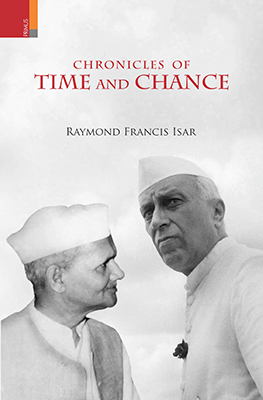
INFORMATION
- AUTHOR : Raymond Francis Isar
- HB ISBN : 978-93-84082-36-9
- Year : 2015
- Extent : 278
- Discount available on checkout
- Usually dispatched within 3 to 5 working days.
Tagore
| HB ₹ 995 . $ . ₤ |
PB ₹ . $ . ₤ |
|
| POD ₹ . $ . ₤ |
e-Book ₹ . $ . ₤ |
INFORMATION
- AUTHOR –
- ISBN – 978-93-84082-78-9
- Year – 2016
- Extent: 400 + 40 coloured illustrations
- 10% discount + free shipping
- Usually dispatched within 3 to 5 working days.
This book questions the myths, action models, and growing corruption of the new Indian ruling class after Independence. Far more than simply autobiographical, these selections from the memoirs of a former ICS officer offer a fascinating cultural and social history of the subcontinent, notably of the Indian-Christian community of the Punjab in the first half of the twentieth century. They explore the conditions in which conversions were made and delineate entanglements between ideas and imaginings of a freshly Westernized lower middle class and the culture of the colonizers. They recount how, as a young District Officer, the author
confronted the cultural challenges of rural postings in the extreme south; the implications of being a fledgling Guardian; and his experience of the bloodletting of 1947 in New Delhi. The concluding chapters capture the political manoeuvrings of the last Nehru years as well as the prime ministerial life and times of Lal Bahadur Shastri, his still undervalued successor.
The Editor
Raymond Francis Isar was born in 1916 in Sialkot (Pakistan), in a hybrid Catholic family. His father was a convert from Hinduism, while his maternal grandparents were originally Sufis. He was educated at St. Stephen’s College, Delhi and Balliol College, Oxford. In 1940 he joined the Indian Civil Service and in 1948 the Indian Foreign Service. In 1956 he was obliged to resign from the IFS on account of his second marriage to a foreign national. In 1967 he took up a new career in journalism. In 1971 he settled in Paris, where he passed away in November 2009.
The over 2,000 pages of memoirs he left behind, from which the selections in this
book have been culled, focus on the cultural and social history of his time and place(s).
As a global figure, Tagore transcends the boundaries of language and reaches out to people distant both in time and space. His art took inspiration from contemporary Western trends and became a powerful means to connect with people beyond Bengal. Word, image, song, and text were his tools of communication, as also his extraordinary presence in a sartorial garb of his own design. A littérateur in many genres, the impact of his work was determined both by the material he presented, and by its simultaneously local and global contexts. Now, when his international reputation has spanned over more than a hundred years, it is important to revisit the sites of Tagore’s eminence, and ask to what extent he was a ‘living text’ in the century that witnessed him as a global intellectual.
Accordingly, this volume investigates how Tagore’s writings and art are linked to the metalinguistic domains of the psychological, medical and mythical; how he was received in various cultures outside India; how his art was determined by individual circumstances and global aspirations; and how he acted as an inspiration to his contemporaries and subsequent generations including modern Indian writers and artists.
The Editor
Imre Bangha studied in Budapest and Santiniketan and at present is Associate Professor of Hindi at the University of Oxford. He has published books and essays in English, Hindi, and Hungarian on literature in Brajbhasha and other forms of old Hindi and has also prepared Hungarian translations from various South Asian languages. His work on the international reception of Bengali culture includes Rabindranath Tagore: Hundred Years of Global Reception (2014, co-edited with M. Kämpchen) and Hungry Tiger: Encounter between India and Central Europe (2007).




